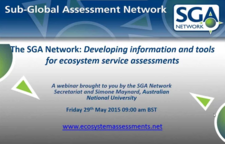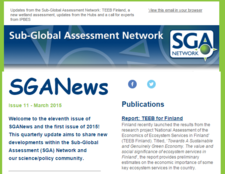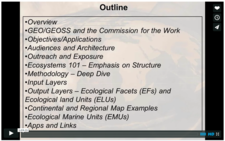Resources
-
SGANews Issue 12 – June 2015
-
IPBES Conceptual Framework - Lesson 1: An introduction to IPBES and IPBES assessments
IPBES Conceptual Framework - Lesson 1: An introduction to IPBES and IPBES assessments
This eLearning module aims to support assessment practitioners at sub-national to global scales in designing, implementing or understanding assessments of biodiversity, ecosystems and their benefits to people. It is based on the IPBES Conceptual Framework and is divided into three lessons.
In Lesson 1 you will learn about the purpose of IPBES and the characteristics of IPBES assessments.
- Take this lesson online (desktop, laptop or tablet) (HTML5 version – opens in a new window)
- Take this lesson online (desktop or laptop) (Flash version – opens in a new window)
- Download this lesson to take offline (desktop or laptop) (downloads zip file)
- Guidance document for offline lesson (PDF download)
-
IPBES Conceptual Framework - Lesson 2: Exploring the IPBES Conceptual Framework
This eLearning module aims to support assessment practitioners at sub-national to global scales in designing, implementing or understanding assessments of biodiversity, ecosystems and their benefits to people. It is based on the IPBES Conceptual Framework and is divided into three lessons.
In Lesson 2 you will learn about the IPBES Conceptual Framework, its elements and key attributes.
- Take this lesson online (desktop, laptop or tablet) (HTML5 version – opens in a new window)
- Take this lesson online (desktop or laptop) (Flash version – opens in a new window)
- Download this lesson to take offline (desktop or laptop) (downloads zip file)
- Guidance document for offline lesson (PDF download)
-
IPBES Conceptual Framework - Lesson 3: Applying the IPBES Conceptual Framework
This eLearning module aims to support assessment practitioners at sub-national to global scales in designing, implementing or understanding assessments of biodiversity, ecosystems and their benefits to people. It is based on the IPBES Conceptual Framework and is divided into three lessons.
In Lesson 3 you will learn how to use the IPBES Conceptual Framework within the context of an IPBES assessment (regional, global, thematic or methodological) or your own national (or sub-national) assessment.
- Take this lesson online (desktop, laptop or tablet) (HTML5 version – opens in a new window)
- Take this lesson online (desktop or laptop) (Flash version – opens in a new window)
- Download this lesson to take offline (desktop or laptop only) (downloads zip file)
- Guidance document for offline lesson (PDF download)
-
Insights from Ecosystem Service assessment integration into policy and the ValuES methods inventory
2015 Series: Webinar 4
Speakers: Alejandro von Bertrab (GIZ) and Augustin Berghöfer (Helmholtz Centre for Environmental Research – UFZ)

Alejandro and Augustin present their insights regarding the challenges of integrating ecosystem service assessments into policy. Concepts such as credibility, relevance, and legitimacy of ecosystem service assessments will be discussed as well as presenting the ValuES methods inventory and how it can be used.
-
Meeting of the Sub-Global Assessment Network Regional Hub for Latin American and the Caribbean Hub (SGAN LAC Hub)
The SGAN LAC Hub meeting, Bogota, Colombia, 26th to 28th July 2015
The primary objectives of the meeting were to consolidate the Sub-Global Assessment Network (SGAN) Regional Hub for Latin America and the Caribbean (SGAN LAC Hub) and to position it as a relevant player to support the development of ecosystem assessments in the region. The LAC Hub is intended to support the work of the SGAN global Secretariat by strengthening capacities in the region on ecosystem assessments and in promoting a common understanding of approaches and tools, as well as supporting key global processes. The LAC Hub seeks to promote dialogues and integration of initiatives at the “Science-Policy” interface; promotes the exchange of capacity and experiences within the region; offers opportunities for training; and creates strong links to the scientific community and to relevant information and data sources for undertaking ecosystem assessments.
The meeting was organized by Colombia’s Research Institute of Biological Resources Alexander Von Humboldt with support of the World Conservation Monitoring Center – (UNEP-WCMC), which hosts the SGA Network Secretariat. There were 80 participants attending from Colombia, Saint Lucia, Chile, Uruguay, United States of America, Brazil, Argentina, Costa Rica, Venezuela, Ecuador, Trinidad and Tobago, Panama, Dominican Republic, Cuba, Mexico, Honduras, Peru, Saint Kitts and Nevis, and two representatives from Germany and the UK.
As outcomes of the meeting the participants were able to have an understanding of the latest information on ecosystem assessments; identify built-in capacities and needs to strengthen ecosystem assessments in the region; and come up with the first activities to define the content for the LAC Hub’s work program of 2016-2017, including operational, administrative and financial considerations for its successful implementation.
The meeting also provided opportunities for networking among professionals working on ecosystem assessments in the LAC region. During the event, the Research Institute of Biological Resources Alexander Von Humboldt from Colombia was elected as the Technical Secretariat of the LAC Hub for a two-year period 2016 – 2018.
You can read the meeting report (in Spanish) by selecting the link below.
Download -
Actions for Arctic Biodiversity: implementing the Arctic Biodiversity Assessment
2015 Series: Webinar 3
Speaker: Courtney Price, Conservation of Arctic Flora and Fauna (CAFF)

Courtney Price (Conservation of Arctic Flora and Fauna (CAFF)) partners with the SGAN Secretariat to present on “Actions for Arctic Biodiversity: implementing the Arctic Biodiversity Assessment”.
Merging the worlds of science and policy, this webinar presentation by Courtney Price will describe the CAFF and Arctic Council process to develop actions from a regional assessment on biodiversity.
-
Developing information and tools for ecosystem service assessments
2015 Series: Webinar 2
Speaker: Simone Maynard, Australian National University
Simone Maynard (Australian National University) partners the SGAN Secretariat to present on 'Developing information and tools (frameworks) for ecosystem service assessments'. This presentation draws upon local, national and global scale research and practical experience in developing frameworks to evidence why and how the process applied is more important than the final product produced! In conclusion, recommendations are provided for researchers to determine an appropriate process to develop a framework for ecosystem services assessments.
-
SGANews Issue 11 – March 2015
-
A new global ecological land units map
2015 Series: Webinar 1
Speaker: Dr Roger Sayre, USGS
The SGAN Secretariat partnered with Dr Roger Sayre to present and discuss the new global Ecological Land Units (ELU) map. The new global ELUs map and database were developed in response to the need, and an intergovernmental commission, for a high resolution and data-derived global ecosystem map. This map subdivides the Earth’s surface into relatively fine, ecological land areas and is designed to be useful for various types of ecosystem research and management applications, including assessments of climate change impacts to ecosystems, economic and non-economic valuation of ecosystem services, and conservation planning.


